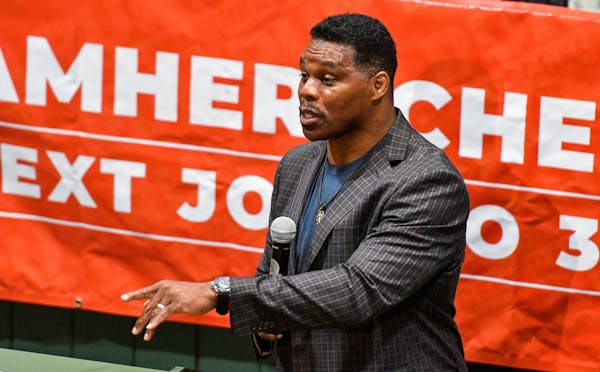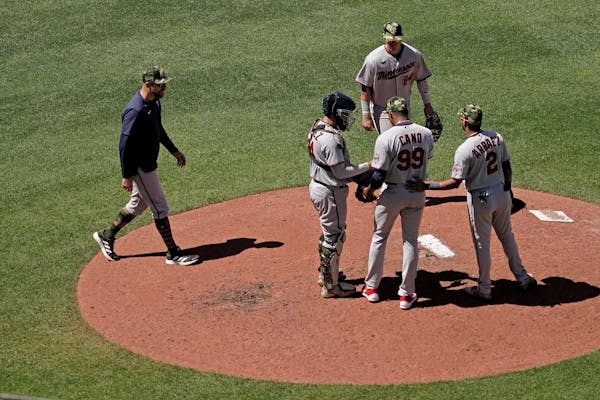The Twins didn't have Byron Buxton, Carlos Correa or Royce Lewis in their starting lineup on Sunday. They overcame a six-run deficit to win 7-6 at Kansas City, putting them on pace to win 99 games and enrage 1 million fans.
Roughly a quarter of the way through the 2022 season, the Twins will start a homestand on Monday against Detroit at Target Field, and it seems that a large number of vocal fans will care more about the posted lineup than the final boxscore.
They want to see Buxton and Lewis in the lineup every day. Which is understandable. They are the two most spectacular athletes in the organization.
Where angry fans and the Twins bosses differ is in the assessment of downside risk.
Bettors, businesspeople and baseball bosses are obligated to assess downside risk — the chance of the return on an investment being less than expected.
The Twins plan to rest Buxton regularly, in the hope of getting 100 to 110 productive games out of him. He's playing despite patella tendinitis in his right knee. He has averaged 54 games played over the past four seasons. He requires full days off to undergo therapy and rest. His knee hurts when he swings, which means using him as a DH is not a solution.
If you are not responsible for Buxton's health, you might be willing to say, "Play him every day; see what happens." If you are in charge and your large medical staff is telling you that Buxton won't stay healthy unless he receives regular rest, you cannot in good conscience play him every day.
Lewis poses a more subtle form of risk. In his first 11 games in the majors, he hit .308 and produced an outstanding .889 OPS, while playing spectacularly at shortstop and running the bases like the second coming of Buxton.
When Correa returned from injury, the Twins had two choices: Send Lewis back to St. Paul, or move him to another position.
If they had moved Lewis to third, they would be displacing Gio Urshela, an excellent fielder who produced the winning hit Sunday. If they moved Lewis to first, they would be asking him to adapt to a tricky position while playing for a first-place team.
First base looks easy, but Justin Morneau, a remarkable athlete and diligent worker, took years to master it. Joe Mauer, one of the most polished and versatile athletes in Minnesota history, took a year or two to become adept there.
Left field is like first base — easy relative to shortstop, but tricky if you haven't worked at it.
Lewis made only 40 plate appearances in the majors. That's not a body of work upon which any scout or general manager would base a major decision. Playing Lewis at an unfamiliar position for a team trying to win its division introduces potential failure — downside risk — into an ideal scenario.
Lewis went back to St. Paul filled with confidence, to fulfill the Twins' original goal for him this season — to finally amass at-bats in the high minors after years of injury and COVID shutdowns. The Twins are 4-0 since he was demoted.
Arguing that Lewis should stay in the big leagues with Correa healthy also presumes that Lewis will significantly outperform hitters like Luis Arraez, Trevor Larnach and Gilberto Celestino, and also that, playing an unfamiliar position, he wouldn't injure himself running into an outfield wall.
So much of the angst around these decisions seems fueled by Pohlad Paranoia, the suspicion of Twins fans that the family that owns the Twins doesn't want to win.
That feeling is based in reality. Carl Pohlad didn't try to win in the late 1990s and offered his team for contraction.
The Pohlads currently running the franchise gave Mauer a top-of-the-market $184 million contract; signed Josh Donaldson and Correa to megadeals; and extended Buxton despite his injuries.
This much is certain: Twins boss Derek Falvey and manager Rocco Baldelli signed on to win a World Series. Their decisions on Buxton and Lewis weren't some kind of surrender, just an acknowledgement of downside risk.

Souhan: Jones isn't the best Vikings running back, but he might be the most likeable

Cashman is back, and he's money against the Jaguars

Souhan: The Sam Slide is here. How will the Vikings handle it?



